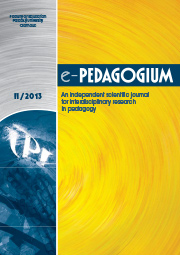e-Pedagogium 2018, 18(2):21-35 | DOI: 10.5507/epd.2018.017
Inclusive Early Childhood Education, Play and Recreational Activities as Predictors of Social Adjustment of Children with Hearing Impairment in Oyo State, Nigeria
- Francesca Uko, Institute of Special Eucation, Faculty of Education, Palacký University Olomouc, Uko, Francesca Uche-Ezekiel Ministry of Education, Special Education Centre Uyo Akwa Ibom State, Nigeria e-mail: easyfavo@gmail.com
This study investigated inclusive early childhood education, play and recreational activities as predictors of social adjustment of children with hearing impairment in Oyo State, Nigeria. A sample of two hundred and seventy (270) participants comprising of 150 teachers having children with hearing impairment in their classrooms and 120 parents of children with hearing impairment. A ten (30) item questionnaire with a 4-point rating scale and reliability coefficient of 0.71 to 0.77 was used to collect teachers' and parents' opinions on inclusive early childhood education, play and recreational activities as predictors of social adjustment of children with hearing impairment. The data collected were statistically analyzed using Pearson Product Moment Correlation and was used to determine the significant relationship in the stated research questions while Multiple Regression Analysis (MRA) was used to verify whether the independent variables predicted the dependent variable or not. The findings revealed that the independent variables (inclusive early childhood education, play and recreational activities) were associated and predicted social adjustment of children with hearing impairment in Oyo State, Nigeria. The authors recommended among others that parents should enroll their children in an early childhood education program as part of the early intervention package for the child to help the child start making early interactions with other children in social contexts.
Keywords: Inclusive, early childhood education, play, recreational activities, social adjustment
Published: June 1, 2018 Show citation
| ACS | AIP | APA | ASA | Harvard | Chicago | Chicago Notes | IEEE | ISO690 | MLA | NLM | Turabian | Vancouver |
References
- Aidina, D. F. and Haji, R. F. (2013). Development of children in one culture. International Journal of Disability, 5 (2) 45-57.
- Awhol, J. and Veshim, V. (2017). Exercise biology and medicine: Innovative research to improve global health. Mayo Clinic Proceedings, 89, 148-153.
 Go to original source...
Go to original source... - Budeua, F. and Haji, B. (2013). Disentangling motivation, intention and planning in the physical activity domain. Journal of sport psychology & exercise, 7, 15-27.
 Go to original source...
Go to original source... - Buysse, R., Goldman, N. B. and Skinner, A. (2013). The conspicuous absence of people with disabilities in public fitness and recreation facilities: Lack of interest or lack of access? American Journal of Health Promotion, 19(5), 327-329.
 Go to original source...
Go to original source... - Campbell, C. V. and Jag, D. (2012). Together through play: Facilitating meaningful play for disabled & non-disabled children through participatory design. Journal of Rehabilitation Research, 9, 1-14.
- Catedral, C. and Wayne, F. (2017). Preparation and job demographics of adapted physical educators in the Nigeria. Adapted Physical Activity Quarterly, 15, 141-154.
 Go to original source...
Go to original source... - Docafer, M. A. (2017). Introduction to the inclusive early childcare education. Journal of Economic Literature, 36, 1465-95.
- Ertmold, E. and Hassen, G. K. (2015). Inclusive play: Practical strategies for working with children aged 3 to 8. Journal of psychology, 26, 396-411.
- Fiona, R., Elliott, B. G. and Day, G. (2014). Late adolescent psychological adjustment: Roles of individuation, sex, social connectedness, and ambivalence over emotional expression. Journal of Counseling and Development, 3(2), 91-101.
- Gerdes, E. B. and Mallinckrodt, D. C. (2014). Interactionism: Way forward persons with disabilities. Disability Issues, 4, 56-76.
- Hall, D. and Filar, V. G. (2017). Adaptation to disability and its investigation among persons with deafness. Social Sciences and Medicine, 4, 99-108.
- Hugh, E. G. (2015). Fostering integration in community-based rehabilitation programs through inclusive recreation. Journal of Inclusive Development 37, 392-397.
- Justin, H. B. (2011). Inclusive recreation psychology: Promoting social adjustment among the deaf. Adapted Physical Activity Quarterly, 19, 280-299.
- Kiy, R. and Fhodu, Y. (2015). The training in community living model: a decade of experience. New Directions for Mental Health Services 26, 1-98.
- Sobel, K. Katie, O. and Kientz, J. (2015). Maximizing children's opportunities with nklusive play: Considerations for interactive technology design. Journal of Rehabilitation Research, 14, 13-24.
 Go to original source...
Go to original source... - Tokpe, E. F. and Chalu, N. (2012). A comprehensive approach to early inclusive education. The Economic Journal, 112, 437-58.
- Ural, H. and Denka, G. T. (2010). Adapted physical education consultant model to facilitate integration. Adapted Physical Activity Quarterly, 12, 12-33.
 Go to original source...
Go to original source... - Wedra, S. (2014). Attitudes toward children with hearing impairment: Sport and recreation. Adapted Physical Activity Quarterly, 20, 323-346.
- Yemi, F. and Kainde, G. (2016). An alternative to mental health treatment: Conceptual model, treatment program, and clinical evaluation. Archives of General Psychiatry 37, 392-397.
 Go to original source...
Go to original source...
This is an open access article distributed under the terms of the Creative Commons Attribution-NonCommercial-ShareAlike 4.0 International License (CC BY-NC-SA 4.0), which permits non-comercial use, distribution, and reproduction in any medium, provided the original publication is properly cited. No use, distribution or reproduction is permitted which does not comply with these terms.






